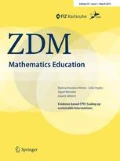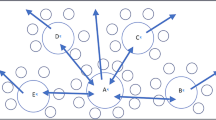Abstract
The relationship between acquisitionism and participationism is a challenge in research on and with teachers. This study uses a patterns-of-participation framework (PoP), which aims to develop coherent and dynamic understandings of teaching as well as to meet the conceptual and methodological problems of other approaches. The paper presents PoP theoretically, but also illustrates its empirical use. It presents a novice teacher, Anna, who often engages with mathematics and with aspects of ‘the reform’ in ways that link well with how she builds relationships with her students and positions herself in her team of teachers. However, in other situations her engagement with mathematics is overshadowed by her involvement in other practices. The study suggests that there is some potential in PoP in spite of methodological difficulties.

Similar content being viewed by others
References
Ball, D. L., Thames, M. H., & Phelps, G. (2008). Content knowledge for teaching: What makes it special? Journal of Teacher Education, 59(5), 389–407.
Bauersfeld, H. (1994). Theoretical perspectives on interaction in mathematics classrooms. In R. Biehler, R. W. Scholz, R. Strässer, & B. Winkelmann (Eds.), Didactics of mathematics as a scientific discipline (pp. 133–146). Dordrecht: Kluwer.
Blumer, H. (1969). Symbolic interactionism. Perspective and method. Berkeley: University of Los Angeles Press.
Boaler, J., & Greeno, J. G. (2000). Identity, agency, and knowing in mathematics worlds. In J. Boaler (Ed.), Multiple perspectives on mathematics teaching and learning (pp. 171–200). Westport, CT: Ablex.
Brown, T., & McNamara, O. (2010). New teacher identity and regulative government. New York: Springer.
Charmaz, K. (2000). Grounded theory: Objectivist and constructivist methods. In N. K. Denzin & Y. Lincoln (Eds.), Handbook of qualitative research (2nd ed., pp. 509–535). Thousand Oaks, CA: SAGE.
Charmaz, K. (2006). Constructing grounded theory. A practical guide through qualitative analysis. London: Sage.
Cobb, P. (2007). Putting philosophy to work: Coping with multiple theoretical perspectives. In F. K. Lester (Ed.), Second handbook on research on mathematics teaching and learning (Vol. 1, pp. 3–38). Charlotte, NC: NCTM & IAP.
Cobb, P., & Yackel, E. (1996). Constructivist, emergent, and sociocultural perspectives in the context of developmental research. Educational psychologist, 31(3/4), 175–190.
Ernest, P. (1991). The philosophy of mathematics education. London: Falmer.
Flyvbjerg, B. (2006). Five misunderstandings about case study research. Qualitative inquiry, 12(2), 219–245.
Hodgen, J., & Askew, M. (2007). Emotion, identity and teacher learning: Becoming a primary mathematics teacher. Oxford Review of Education, 33(4), 369–287.
Holland, D., Skinner, D., Lachicotte, W, Jr, & Cain, C. (1998). Identity and agency in cultural worlds. Cambridge, MA: Harvard University Press.
Horn, I. S., Nolen, S. B., Ward, C., & Campbell, S. S. (2008). Developing practices in multiple worlds: The role of identity in learning to teach. Teacher Education Quarterly, 35(3), 61–72.
Hoyles, C. (1992). Mathematics teachers and mathematics teaching: A meta-case study. For the Learning of Mathematics, 12(3), 32–44.
Lave, J. (1988). Cognition in practice. Cambridge, UK: Cambridge University Press.
Lave, J. (1996). The practice of learning. In S. Chaiklin & J. Lave (Eds.), Understanding practice. Perspectives on activity and context (pp. 3–32). Cambridge: Cambridge University Press.
Lave, J., & Wenger, E. (1991). Situated learning. Legitimate peripheral participation. Cambridge: Cambridge University Press.
Leder, G. C., Pehkonen, E., & Törner, G. (Eds.). (2002). Beliefs: A hidden variable in mathematics education?. Dordrecht: Kluwer.
Lerman, S. (2001). A review of research perspectives on mathematics teacher education. In F.-L. Lin & T. J. Cooney (Eds.), Making sense of mathematics teacher education (pp. 33–52). Dordrecht: Kluwer.
Lerman, S. (2006). Cultural psychology, anthropology and sociology: The developing strong social turn. In J. Maasz & W. Schlöglmann (Eds.), New mathematics education research and practice (pp. 171–188). Rotterdam: Sense.
Lester, F. K. (2002). Implications for research on students’ beliefs for classroom practice. In G. C. Leder, E. Pehkonen, & G. Törner (Eds.), Beliefs: A hidden variable in mathematics education? (pp. 345–353). Dordrecht: Kluwer.
Ma, L. (1999). Knowing and teaching elementary mathematics. Mahwah, NJ: Lawrence Erlbaum.
Ma, J. Y., & Singer-Gabella, M. (2011). Learning to teach in the figured world of reform mathematics: Negotiating new models of identity. Journal of Teacher Education, 62(1), 8–22.
Maasz, J., & Schlöglmann, W. (Eds.). (2009). Beliefs and attitudes in mathematics education. Rotterdam: Sense.
Mead, G. H. (1934). Mind, self, and society from the standpoint of a social behaviorist. Chicago: University of Chicago.
Morris, C. W. (1962). Introduction. George Herbert Mead as social psychologist and social philosopher. In C. W. Morris (Ed.), Works of George Herbert Mead. Mind, self, and society from the standpoint of a social behaviorist (Vol. 1, pp. ix–xxxv). Chicago: University of Chicago Press.
Raymond, A. M. (1997). Inconsistency between a beginning elementary teacher’s mathematics beliefs and teaching practice. Journal for Research in Mathematics Education, 28(5), 550–576.
Rösken, B., Törner, G., & Pepin, B. (Eds.) (2011). Beliefs and beyond: Affecting the teaching and learning of mathematics. ZDM—the International Journal on Mathematics Education, 43(4), 451–615.
Rowland, T., Turner, F., Thwaites, A., & Huckstep, P. (2009). Developing primary mathematics teaching. Reflecting on practice with the knowledge quartet. Los Angeles: SAGE.
Sfard, A. (1998). On two metaphors for learning and the dangers of choosing just one. Educational Researcher, 27(2), 4–13.
Sfard, A. (2008). Thinking as communicating. Human development, the growth of discourses, and mathematizing. Cambridge: Cambridge University Press.
Sfard, A., & Prusak, A. (2005). Telling identities: In search of an analytic tool for investigating learning as culturally shaped activity. Educational Researcher, 34(4), 14–22.
Shulman, L. S. (1986). Those who understand: Knowledge growth through teaching. Educational Researcher, 15(2), 4–14.
Shulman, L. S. (1987). Knowledge and teaching: Foundations of a new reform. Harvard Educational Review, 57(1), 1–22.
Skott, J. (2001). The emerging practices of a novice teacher: The roles of his school mathematics images. Journal of Mathematics Teacher Education, 4(1), 3–28.
Skott, J. (2004). The forced autonomy of mathematics teachers. Educational Studies in Mathematics, 55(1–3), 227–257.
Skott, J. (2008). A cautionary note: Is research still caught up in an implementer approach to the teacher? http://www.unige.ch/math/EnsMath/Rome2008/WG2/Papers/SKOTT.pdf. Accessed 13 Mar 2013.
Skott, J. (2009a). Contextualising the notion of belief enactment. Journal of Mathematics Teacher Education, 12(1), 27–46.
Skott, J. (2009b). Theoretical loops in mathematics education: Theory–practice relationships revisited. Asian Journal of Educational Research and Synergy, 1(2), 74–88.
Skott, J., Larsen, D. M., & Østergaard, C. H. (2011). From beliefs to patterns of participation: Shifting the research perspective on teachers. Nordic Studies in Mathematics Education, 16(1–2), 29–55.
Speer, N. M. (2008). Connecting beliefs and practices: A fine-grained analysis of a college mathematics teacher’s collections of beliefs and their relationship to his instructional practices. Cognition and Instruction, 26, 218–267.
Sztajn, P. (2003). Adapting reform ideas in different mathematics classrooms: Beliefs beyond mathematics. Journal of Mathematics Teacher Education, 6(1), 53–75.
Thompson, A. G. (1984). The relationship of teachers’ conceptions of mathematics and mathematics teaching to instructional practice. Educational Studies in Mathematics, 15(2), 105–127.
Voigt, J. (1996). Negotiation of mathematical meaning in classroom processes: Interaction and learning mathematics. In L. P. Steffe, P. Nesher, P. Cobb, G. Goldin, & B. Greer (Eds.), Theories of mathematical learning (pp. 21–50). Mahwah, NJ: Lawrence Erlbaum.
Wagner, D., & Herbel-Eisenmann, B. (2009). Re-mythologizing mathematics through attention to classroom positioning. Educational Studies in Mathematics, 72(1), 1–15.
Wedege, T., & Skott, J. (2006). Changing views and practices? A study of the KappAbel mathematics competition. http://www.matematikksenteret.no/content.ap?thisId=57&language=0. Accessed 13 Mar 2013.
Wenger, E. (1998). Communities of practice. Learning, meaning, and identity. Cambridge: Cambridge University Press.
Wilson, M., & Cooney, T. J. (2002). Mathematics teacher change and development. The role of beliefs. In G. C. Leder, E. Pehkonen, & G. Törner (Eds.), Beliefs: A hidden variable in mathematics education? (pp. 127–148). Dordrecht: Kluwer.
Author information
Authors and Affiliations
Corresponding author
Rights and permissions
About this article
Cite this article
Skott, J. Understanding the role of the teacher in emerging classroom practices: searching for patterns of participation. ZDM Mathematics Education 45, 547–559 (2013). https://doi.org/10.1007/s11858-013-0500-z
Accepted:
Published:
Issue Date:
DOI: https://doi.org/10.1007/s11858-013-0500-z




